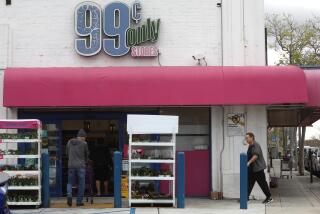A century-old merchant’s decline
- Share via
The holiday catalogs are already being mailed out by Harry & David, offering the century-old merchant’s trademark luxury gifts including gourmet fruit from Oregon’s Rogue River Valley, with a promise of “happiness delivered.”
The picture is much less cheerful at the company’s headquarters in Medford, Ore., where corporate cost-cutting and absentee management belie the firm’s public face as a folksy, agrarian outfit with roots as solid as those growing under the pear trees in Harry & David’s orchards.
Since New York-based private equity investors bought Harry & David six years ago, the company has sliced its workforce by a third and cut back on raises and benefits.
The turmoil worsened this year when the company’s longtime chief executive, widely viewed as a pillar of the local community, was fired and replaced by a hotel executive who had left his previous high-profile job under a cloud.
The new chief executive, who is running Harry & David from an office near his home in Atlanta more than 2,000 miles away, cleaned out the rest of the executive suite soon after taking over in February. Within a few months, new faces occupied nearly all of the company’s 20 top positions. More lower-level workers were let go in April, and management has been farming out to contractors some work that had been done in-house.
Among the remaining staff, the mood is described as one of gloom and apprehension.
“You walk around and you see that people have taken down their family pictures in their cubicles,” said a headquarters employee, who, like other staffers, did not want to be identified for fear of being fired. “Tomorrow, if security comes to get them, they don’t want to have to pack up.”
The company’s circumstances can be explained in part by the country’s economic downturn, which has sharply depressed demand for most upscale goods. Harry & David’s sales have plunged 25% from their peak before the recession.
But that pain has been compounded by debt that has made it harder for the company to make a profit. The investors who acquired Harry & David in 2004 first loaded it up with debt to finance the deal. Then they piled on more debt a few months later to pay themselves back all the cash they put up to buy the company.
“This is a classic case of a leveraged buyout,” said Raj Parikh, dean of the business school at Southern Oregon University in nearby Ashland. “They hoped to increase the earnings through a combo of slashing expenses and then paying off the debt.”
Ellis Jones, chief executive of New York private equity firm Wasserstein & Co., which led the buyout, acknowledged that the interest payments that Harry & David now must make are a drag on the company. But he said the borrowing appeared prudent at the time.
“Based on the company’s performance, the leverage we put on the company looked extremely conservative,” Jones said. “It was only after the great recession — the 100-year flood — that financing became an issue.”
The combination of plunging sales and heavy debt has not only ravaged Harry & David’s workforce, but it also has caused business leaders in the Medford area, where the company is the largest private employer, to worry about the local economy.
“For the average person that landed in Medford 20 years ago, they saw Camelot,” a promised land of good jobs and beautiful scenery in the mountainous southwest corner of the state, said Bill Thorndike, owner of a local manufacturing firm who is on the boards of the charitable Oregon Community Foundation and the Oregon Business Council, a group of prominent corporate leaders. “It’s something that we took a great amount of pride in — we had this economic engine that paid well and that played well with the community. It’s not that anymore.”
The story of Harry & David began in 1910, when Samuel Rosenberg traded his Seattle hotel for orchards in southern Oregon that grew the distinctive fleshy, red and green Comice pears. After his sons, Harry and David Holmes, took over, they began marketing the pears as high-end gifts and sold them to affluent city folk.
In 1984, the family sold the business to RJR Nabisco, the first of a number of corporate owners, the longest lasting of which was Yamanouchi, a Japanese pharmaceutical conglomerate.
The outside owners relied on Medford-based executives to run the company, including Bill Williams, who was CEO for two stints starting in 1988 before he was fired in February.
Under Williams, the company expanded its product line and its distribution, opening a chain of retail stores that now number 125 nationwide.
Harry & David’s bestsellers these days are fruit-of-the-month boxes — which cost about $350 for a year of deliveries — and $40 drums of Moose Munch candied popcorn. Pricey baked goods and chocolates also are sold, most of them made at the Medford headquarters.
In June 2004, Yamanouchi sold Harry & David for $252.9 million to the group led by Wasserstein & Co. The investment firm was founded by deal maker Bruce Wasserstein, who was famous on Wall Street for his role in the 1988 hostile takeover of RJR Nabisco (two years, incidentally, after RJR sold Harry & David). Bruce Wasserstein died last fall.
Seven months after the buyout, Harry & David had $245 million in long-term debt on its balance sheet, something it had none of before the acquisition, although the firm was known to borrow each year to pay for holiday inventory, paying the money back after the seasonal sales spike.
The company is now on the hook for about $20 million a year in interest, an expense that helped turn the company unprofitable after sales sank.
In the fiscal year that ended in June 2009, the company had a loss of $20.2 million on sales of $490 million. The loss widened to $39.2 million in the latest fiscal year as sales dropped to $427 million.
“The company could go under very quickly because with big interest payments all they need are a few bad years,” said Parikh, the Southern Oregon business school dean.
In a regulatory filing, the company acknowledged that its bonds “require us to dedicate a substantial portion of our cash flow from operations to debt service, reducing the availability of our cash flow to use for other purposes” while limiting “our ability to capitalize on significant business opportunities.”
Meanwhile, thanks to the debt, Harry & David’s new owners have already gotten back everything they invested in the company, and then some. In the acquisition, the investors put up only $82.6 million in cash. Since then, they have received more than $100 million in cash, directly and indirectly, from Harry and David’s coffers — and they still own the company.
Jones defended the payouts, saying the investors were the private equity firm’s first priority.
“Whatever we do, we do on behalf of our investors … who have entrusted their capital with us to buy companies,” he said.
Wasserstein & Co. prepared to take Harry & David public in 2008, but canceled those plans after sales began to slide.
Rank-and-file employees who still have their jobs have felt pain in the form of benefit cutbacks that began even before sales tumbled. The company froze its traditional pension plan, then suspended contributions to its 401(k) plan. Most yearly raises also have come to an end, according to employees.
The hiring this year of executives from the outside prompted a surge in workplace gossip after the staff searched the Internet for information on their new bosses.
The new CEO, Steve Heyer, lost his most recent high-profile job as chief executive at Starwood Hotels after facing allegations that he had sent inappropriate sexual e-mails to underlings.
Ross Klein, whom Heyer brought in to run Harry & David’s new branding effort, left a job at Hilton Hotels in 2008 after he was accused of corporate espionage, an allegation that is a subject of a federal criminal investigation. Klein is working out of an office near his home in Beverly Hills.
Heyer and Klein have denied any wrongdoing.
Jones of Wasserstein praised both men.
“The only thing I will say in connection with either of them is that these are first-rate executives and they are both extraordinarily talented, and we’re very proud and happy to have them working for us,” he said.
The new executives, he added, are positioning the company for the future by creating partnerships with other retailers and by revamping its website and tweaking some recipes.
“Our objective is to have this be a leading consumer product specialty food company and a real pride of the Northwest,” Jones said.
Another new top executive, Drew Reifenberger, is responsible for customer relations. Like Heyer, he is working out of an office in Atlanta.
The hirings have an added sting for employees because of the compensation the newcomers are getting. Heyer is making $9.7 million this year; his predecessor earned $1.4 million last year.
Employees also are miffed that Heyer decided not to move to Oregon from Atlanta. Instead, the company is paying for an office for him in Georgia and first-class flights for his visits to Medford, a town of 77,000 between the Cascades and the Siskiyou Mountains.
Heyer has tried to rally the troops. He spent all of August in Medford. Earlier in the summer he hosted a barbecue for employees.
In some unusual moves since he took over, hourly workers are now called “talent” instead of employees. And staff members were asked to sign a “Harry & David Culture Promise,” which says, “We laugh as we learn, and we are committed to being the world’s most joyful brand, delivering happiness to each other.”
Those who were reluctant to sign the document were pressured to do so by their supervisors, employees said.
Ed Dunlap, chief financial officer at Harry & David, said he wasn’t aware of any such pressure.
“My understanding and impression is that employees embraced it — that there was finally a definition of values, and employees signed it as an indication of their commitment,” Dunlap said.
For workers, perhaps the biggest change might be a shrunken staff. At the end of July, Harry & David had 1,026 full-time employees, down from 1,538 in 2005. The company this year was even briefly at odds with local authorities who said it no longer had enough employees to qualify for a local tax break.
The new, long-distance management at Harry & David also has sharply reduced the firm’s once-generous philanthropic involvement in the local community, said Ron Fox, executive director of Southern Oregon Regional Economic Development, a nonprofit group.
The situation has created a “great deal of apprehension and concern,” Fox said. “The question I hear in the community is, ‘What are the implications for us?’ and ‘Where does our beloved Harry & David go beyond this?’ ”
nathaniel.popper@latimes.com
More to Read
Inside the business of entertainment
The Wide Shot brings you news, analysis and insights on everything from streaming wars to production — and what it all means for the future.
You may occasionally receive promotional content from the Los Angeles Times.










